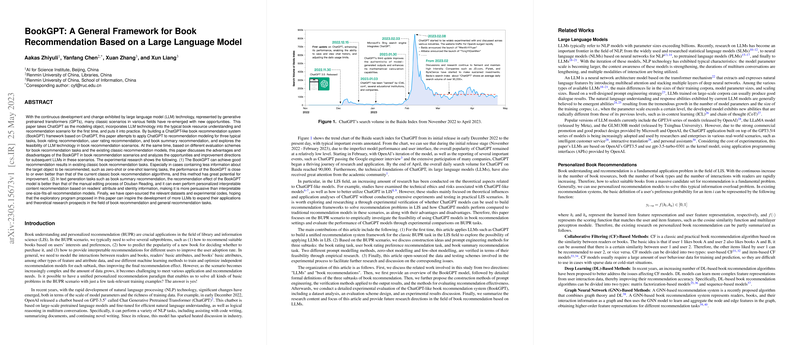Overview of BookGPT
Innovative technologies have introduced novel frameworks in the field of book recommendations. A recent exploration into this domain has led to the development of BookGPT, a system that leverages LLMs, like that of ChatGPT, to offer a unique approach to suggesting books. This method integrates the transformative capabilities of LLMs to comprehend and recommend literature in a personalized and engaging manner. Moreover, BookGPT has been designed to perform well across various traditional recommendation subtasks and extends to scenarios with minimal data, showing promise in its performance against classical algorithms.
Understanding the BookGPT Framework
The proposed BookGPT framework addresses three primary tasks: book rating recommendation, user rating recommendation, and book summary recommendation. Each of these tasks capitalizes on LLMs' ability to understand and process natural language inputs effectively. The architecture of BookGPT includes task definitions, prompt engineering for optimized interaction with the LLM, and mechanisms for both interaction response parsing and task evaluation.
In practice, BookGPT can provide ratings for new books based on limited or no additional information. Similarly, it can robustly predict user preferences and generate engaging book summaries. Task-specific strategies are formulated through prompt engineering to amplify the model's performance, direct its responses, and ensure output conformity with the stipulated format.
Experimental Evaluation
BookGPT was subjected to rigorous testing to validate its abilities in various book recommendation subtasks. Researchers compared BookGPT’s performance with classical recommendation models, utilizing zero-shot and few-shot learning methods. The experiments demonstrated that the BookGPT model could offer competitive recommendation outcomes, excelling in situations with sparse data.
Furthermore, a detailed investigation into the book summary task showed that BookGPT could generate summaries on par with human-produced synopses. Comparative analysis with standard models allowed the researchers to discern BookGPT's efficacy and potential areas for improvement, particularly concerning factual accuracy in summarization.
Future Prospects and Potential Innovations
The research encourages future investigation into refining BookGPT for specific domain scenarios. Personalization could be enhanced by incorporating user feedback into a multi-round conversational recommendation system. This approach could boost the adaptability and user satisfaction with the recommendations provided.
Moreover, there is significant scope for integrating user information to develop explainable recommendations. This would not only promote transparency but also potentially increase user trust and engagement with the system. In essence, the research lays down the groundwork for more advanced and nuanced applications of LLMs in the library and information science field, paving the way for sophisticated, data-driven recommendation systems.
As the research community advances, BookGPT stands as a manifestation of the combined strengths of human language understanding and machine learning, redefining what is possible in the domain of personalized book recommendations.
